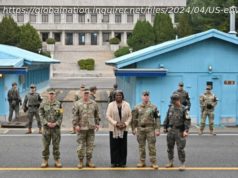Moon Jae-in’s foreign policy moves are seen as threat to longstanding alliance, Financial Times reports.
When Moon Jae-in became South Korean president last month, many feared the former human rights lawyer would shake up the nation’s foreign policies at the expense of its longstanding alliance with the US.
Those concerns gained ground this week after the new leader ordered the suspension of key parts of a US-owned and operated missile shield, a deployment that has become a bellwether for Seoul ‘s relations not only with Washington, but also Beijing .
The move, which coincided with remarks from Mr Moon’s foreign minister nominee that she would reopen contentious talks on Japan ‘s wartime use of sex slaves, set off alarms bells that South Korea was tilting once again into the orbit of China .
More from Financial Times: Trump hits back at Comey over ‘false statements and lies’ How Silicon Valley brought haute cuisine to the office canteen Rescue of Spain’s Popular is the start of Europe’s banking test
Mr Moon’s first key foreign policy decisions, some analysts say, amount to a strategic mis-step and an attempt to please the domestic forces that propelled him to the presidency at the expense of the nation’s broader international relations.
The missile shield decision “was a critical mistake, ” said Kim Jae-chun, a professor at Sogang University and former government adviser.
“He is doing this to please key constituents, to show he cares about his domestic audience. But he will send the wrong message to his foreign counterparts, ” said Prof Kim, adding that the decision was unlikely to please either the US or China.
Senior US officials, including Rex Tillerson at the state department and James Mattis at the Pentagon, have indeed reaffirmed the importance of the Terminal High Altitude Area Defence platform, more commonly known as Thaad.
“Moon Jae-in is trying to implement balanced diplomacy, but unless there is a strong trust and confidence-building, the approach might endanger Korea’s alliance with the US, ” said Lee Myon-woo of the Sejong Institute think-tank.
Meanwhile Beijing has refused to budge. The country has steadfastly opposed the installation of Thaad on the grounds that its powerful X-radar, which was already deployed along with two out of a planned six launchers and will not be suspended, could spy on its own military developments.
When the equipment was unveiled, China quickly launched an economic boycott of South Korean companies that severely affected companies such as Hyundai Motor and retail giant Lotte.
Following Mr Moon’s decision, officials in Beijing on Wednesday simply reiterated their “clear, consistent and firm” opposition to the shield.
“Did this decision please China? They won’t let it go so easily, ” said Prof Kim.
Mr Moon was elected last month following the historic impeachment of then president Park Geun-hye on corruption charges earlier this year.
He rode a wave of popular support by contrasting his open, attentive nature with the authoritarian, opaque ruling style of Ms Park, who had faced withering criticism for pushing through important policies, such as Thaad, without due process.
For many, Wednesday’s decision to halt the deployment of the four additional Thaad rocket batteries to conduct a full environmental assessment was aimed at setting himself apart from Ms Park and underlining his sensitivity to public opinion.
“Moon Jae-in doesn’t seem to want to aggravate the current uncertain situation by proceeding with the deployment, ” said Lee Dong-ryul, professor at Dongduk Women’s University. “Given unfavourable domestic sentiment, he is using procedural legitimacy as an excuse to halt Thaad, while taking his time to persuade China on the matter and improve relations with North Korea.”
However, fears among US officials that South Korea is charting a new foreign policy more sympathetic to China are likely to be exacerbated by the possibility of renewed talks with Japan over Tokyo’s wartime use of sex slaves.
At the behest of the US, the two east Asian nations in 2015 signed a deal to resolve the longstanding source of friction. Japan — an ally of the US and a regional rival to China — offered an apology and payout to “finally and irreversibly” close the matter.
But on Wednesday Mr Moon’s nominee for foreign minister resurrected the issue, telling parliament she would seek to revive official talks.
“I will try to gather wisdom from the victims’ point of view and continue talks with Japan so that sincere measures will be taken, ” said Kang Kyung-wha in comments likely to cause consternation in Tokyo.
This “signals the new government wants to be less influenced by Washington than the previous government. The 2015 agreement was a direct result of Washington’s influence, ” said Song Min-soon, a former foreign minister.
Japan is unlikely to move on the issue and Ms Kang’s comments will sow seeds of mistrust between the two nations, while encouraging China.
“I don’t think she knows how sensitive this issue is. It is not going to happen and to mention it this government is opening up a can of worms, ” said Prof Kim.
Additional reporting by Kang Buseong






